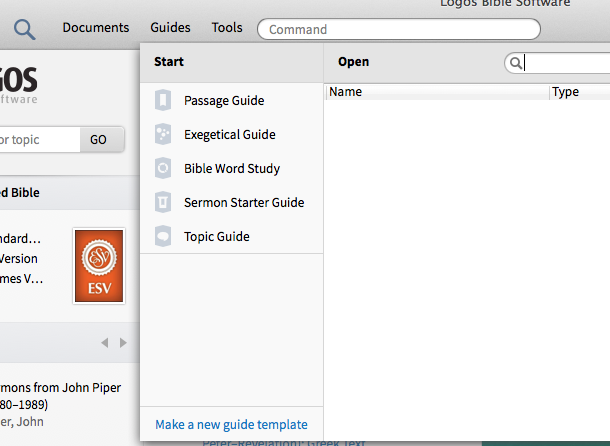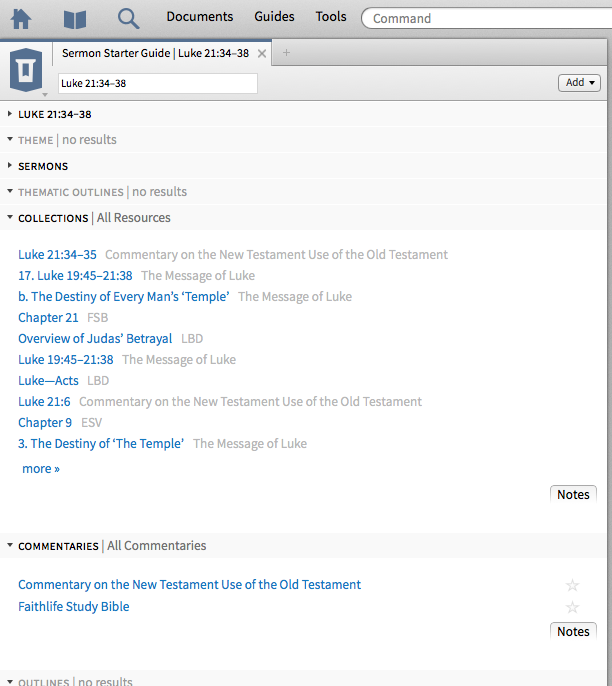A couple of weeks ago I was preparing a message for our church. I have always used Logos as a resource rather than a tool. In my study I would look up a passage in a commentary I own. The ability to search those commentaries and cut and paste into my notes was so helpful. I am always so amazed how quick I have all the information I need. I remember how tedious it was in Bible College working through books to look up the meaning of the word. We are truly spoiled today. The problem we face today is not having the time to search for the information we need. The problem we have today is having a tool that is powerful enough to aggregate great content. This is essentially what Logos does. It data mines content you own and gives you what is most applicable helping you in terms of speed and focus.
While studying I stumbled upon a tool built into Logos that was extremely helpful. It is located in under the “Guide” menu.

It’s called the Sermon Starter Guide. You simply type in your primary text and it gives you the most relevant references that you own based on Sermons Outlines, Collections, Commentaries, Illustrations etc.. It was through this tool that I discovered a helpful passage from Commentary on the New Testament Use of the Old Testament. I was in Luke 21 and the light that was shed on that passage from Exodus was powerful.

One of my pet peeves is when communicators hijack truth they remove it from it’s context and historical moorings and force it to say something it was never intended to say. Many preachers have done this to their own harm, myself included. It doesn’t matter who you are preparing your message for if it be 4-year-old or 85-year-old we have a responsibility to preach with clarity and with understanding. The Commentary on the New Testament Use of the Old Testament does a fantastic job of connecting the context of a passage or word. It’s invaluable to know what the author was thinking or at least what he was referring to. I love how D.A. Carson describes this commentary that he helped put together he says this in the introduction.
Readers will be helped to think through how a particular NT book or writer habitually uses the OT; they will be stimulated to see how certain OT passages and themes keep recurring in the various NT corpora. Moreover, even if some contemporary readers do not think the Bible holds together in any theological sense (as the editors and contributors do), every thoughtful reader must acknowledge that the biblical books themselves have been read that way from the time of their early circulation, and that the writers of the NT books saw themselves not (in some Marcionite fashion) as originators who could cheerfully dispense with whatever they wanted from the OT, but as those who stood under the authority of those OT documents even as they promulgated fresh interpretations of those documents. Whether we think the books of Scripture are the word of God or not, we ought at least to begin by extending to the writers of the NT the courtesy of trying to understand how they saw their task as they cited and explained the documents associated with the old covenant, the documents that they revered as hē graphē (“the Scripture”).
Beale, G. K., & Carson, D. A. (2007). Commentary on the New Testament use of the Old Testament (p. vii). Grand Rapids, MI; Nottingham, UK: Baker Academic; Apollos.
This commentary is rich in both insight and application. Understanding the context in which something was written will go a long ways in keeping us from hijacking parts of the bible to fit our own pet doctrines. As someone who believes very strongly in the biblical case for the sovereignty of God there are enough verses in the bible concerning our choices to make me uncomfortable and that’s actually good. The goal of the OT and the NT isn’t to prove my theology as being most sound it’s to paint a picture of loving savior. Who lived and died for you and me. The Old Testament points to the New Testament and to the cross while the New points to the Old through the cross. Both help to validate and draw out the beauty of each other that finds it’s ultimate fulfillment in Christ.
The contributors to this volume are many men who I respect greatly some are new to me but many I have deep respect for both their knowledge of scripture and their passion for the gospel. I believe that you will find this volume a valuable asset to your collection for personal clarity, study and growth in the gospel.
Check out this video on the sermon starter guide it’s both simple and powerful.
[youtube id=”hM2TOBl72uQ”]

